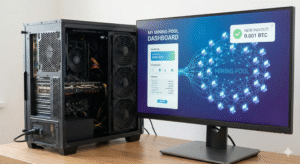Bitcoin Miner Reviews 2025 – Quiet Home Devices
Explore quiet home bitcoin miner reviews for 2025. We test real noise (dB), power at the wall (W), heat (BTU/h), hashrate and efficiency, with clear setup steps, buying advice, and current price ranges so you can choose confidently.
Jump to:
Top Picks (2025)
Fast answers for busy buyers. These six cover most home use‑cases; full details on each review page.
- Avalon Nano 3S — Best “mini‑heater” (SHA‑256)
6 TH/s · ~140 W · ~33–40 dB. Quiet; warms a small room while mining BTC/BCH.
- Avalon Nano 3S — Best “mini‑heater” (SHA‑256)
- Bitaxe Gamma — Best for learning (open‑source)
~1.0–1.2 TH/s · ~20–35 W · Wi‑Fi. DIY‑friendly; great first SHA‑256 miner.
- Bitaxe Gamma — Best for learning (open‑source)
- Braiins Mini Miner BMM‑101 — Best plug‑and‑play SHA‑256
~1 TH/s · ~35–40 W · Ethernet. Clean UI; easy setup.
- Braiins Mini Miner BMM‑101 — Best plug‑and‑play SHA‑256
- Goldshell Mini‑DOGE II — Best apartment Scrypt (LTC + DOGE)
420 MH/s @ 400 W or 335 MH/s @ 260 W · ≤35 dB. Dual‑mode flexibility.
- Goldshell Mini‑DOGE II — Best apartment Scrypt (LTC + DOGE)
- Jasminer X16‑Q — Quiet ETC (Etchash) choice
~1.95 GH/s · ~620 W · ~40 dB. “Set‑and‑forget” for Ethereum Classic.
- Jasminer X16‑Q — Quiet ETC (Etchash) choice
- Goldshell AE Box II — Easy Aleo (ZK) starter
~54 MH/s · ~530 W · Wi‑Fi/Ethernet. Compact ZK miner.
- Goldshell AE Box II — Easy Aleo (ZK) starter
Browse by Algorithm
SHA‑256 (Bitcoin / BCH)
Looking for quiet BTC mining at home? These balance noise, power draw, and hashrate. See the full category → SHA-256
-
- Avalon Nano 3S — 6 TH/s · ~140 W · ~33–40 dB
-
- Bitaxe Gamma — ~1.0–1.2 TH/s · ~20–35 W · Wi‑Fi
-
- Braiins Mini Miner BMM‑101 — ~1 TH/s · ~35–40 W · Ethernet
-
- Bitaxe Hex 701 — ~4.2 TH/s · ~90 W
-
- NerdAxe rev6 — ~1.0–1.3 TH/s (up to ~1.6) · ~20–35 W
Scrypt (Litecoin + Dogecoin)
Merged mining lets you stack LTC + DOGE together. Full category → Scrypt
-
- Goldshell Mini‑DOGE II — 420/335 MH/s · 400/260 W · ≤35 dB
-
- Antminer L7/L9 at Home — 9.3–16 GH/s · ~3.0–3.6 kW · ~70–75 dB (garage/utility room recommended)
Etchash / Ethash (Ethereum Classic)
From whisper‑quiet to industrial. Full category → ETChash
-
- Jasminer X16‑Q — ~1.95 GH/s · ~620 W · ~40 dB
-
- iPollo V1 Mini Classic — ~130 MH/s · ~104 W · compact
-
- Jasminer X44‑P — ~23.4 GH/s · ~2.34–2.55 kW · loud
ZK (Aleo)
Zero‑knowledge (Aleo) miners focus on proof generation. Full category → ZK
-
- Goldshell AE Box II — ~54 MH/s · ~530 W · Wi‑Fi/Ethernet
Quick Comparison
Use a 3‑column table for phones: Product | Hashrate | Power • Notes.
| Product | Hashrate | Power • Notes |
|---|---|---|
| Avalon Nano 3S | 6 TH/s | ~140 W • ~33–40 dB • mini‑heater |
| Bitaxe Gamma | ~1.0–1.2 TH/s | ~20–35 W • Wi‑Fi • DIY |
| BMM‑101 | ~1 TH/s | ~35–40 W • Ethernet • polished UX |
| Bitaxe Hex 701 | ~4.2 TH/s | ~90 W • ~21–22 J/TH • Wi‑Fi |
| NerdAxe rev6 | ~1.0–1.3 TH/s | ~20–35 W • DIY/open‑source |
| Mini‑DOGE II | 420/335 MH/s | 400/260 W • ≤35 dB • Scrypt |
| Antminer L7/L9 | 9.3–16 GH/s | ~3.0–3.6 kW • ~70–75 dB |
| Jasminer X16‑Q | ~1.95 GH/s | ~620 W • ~40 dB • ETC |
| V1 Mini Classic | ~130 MH/s | ~104 W • compact • ETC |
| Jasminer X44‑P | ~23.4 GH/s | ~2.34–2.55 kW • loud • ETC |
| AE Box II | ~54 MH/s | ~530 W • Wi‑Fi/Ethernet • ZK |
Detailed efficiency (J/TH or J/MH) and noise (dB) live on the individual review pages.
Buying Guide
-
- Noise (dB): Under ~40 dB ≈ quiet office; 70+ dB = server‑room.
-
- Power cost (kWh): kWh = (W ÷ 1000) × hours. Example: 140 W ≈ 3.36 kWh/day
-
- Heat (BTU/h): 1 W ≈ 3.412 BTU/h. 140 W ≈ ~478 BTU/h—a gentle, useful warmth. What is a BTU?
-
- Efficiency: SHA‑256 → J/TH; Scrypt/Etchash/ZK → J/MH or J/GH. Lower is better. For a quiet heater‑style pick, start with Avalon Nano 3S. For ultra‑low power learning, see Bitaxe Gamma.
-
- Connectivity: Wi‑Fi is convenient; Ethernet is steadier (fewer stale shares). If cabling is hard, use a Wi‑Fi→Ethernet bridge.
How We Test
- Power: At the wall with a calibrated meter (24‑h average where possible).
- Noise: A‑weighted at 1 m; we also note tone (hum/whoosh) and placement effects.
- Thermals: Exhaust temp via IR spot; room temp logged.
- Setup: UI clarity, pool config, Wi‑Fi vs Ethernet stability.
- Real‑world examples: Electricity cost at €0.10/0.20/0.30 per kWh; BTU/h equivalence.
- Disclosures: We may earn commissions from links on product pages. We never accept payment for rankings.
Are these miners profitable at home?
It depends on electricity price and coin markets. Treat most picks as learn + stack devices first; check each review’s cost examples.
Which algorithm should I choose?
SHA‑256 = BTC/BCH (quiet mini‑heaters like Nano 3S). Scrypt = LTC+DOGE (merged) with Mini‑DOGE II for apartments. Etchash/Ethash = ETC with quiet X16‑Q. ZK = Aleo with AE Box II.
Do you test noise?
Yes—A‑weighted @ 1 m, and we explain tone/placement tips on each page.
Where are prices?
On product pages—kept fresh per model.



